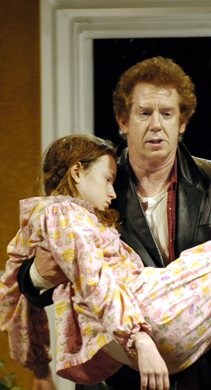
|
JOE EGG
|
|
|
|
JOE EGG
Theater: Actors skillfully tread line between comedy, emotional truth in ‘Egg’ By Lawson Taitte / The Dallas Morning News Joe Egg is the funniest play you’ll ever see about a spastic child. And I mean that in a good way. The Dallas Theater Center opened Peter Nichols’ play on Tuesday (shortening the title from the original A Day in the Death of Joe Egg, fearing perhaps that that might make it seem like a downer). It’s not just an amusing evening in the theater. It’s also a challenging one – just as relevant today as when it was written nearly 40 years ago. Actually, it’s almost two separate plays. There’s a short set-up in which we observe the basic situation: Bri (David Manis) and Sheila (Wendy Rich Stetson) care for their 9-year-old daughter, Josephine (Clara Peretz), who is profoundly disabled. Then for most of the first act, the two address the audience, separately and together, virtually doing a stand-up comedy routine explaining how they got to where they are. The second act is more conventional. We watch Bri and Sheila interacting with his mother (the brilliantly middle-class Sandra Shipley) and their friends Pam (the horribly supercilious Jessica D. Turner) and Freddie (the amusingly vapid James Crawford). Still, the playwright thinks nothing of breaking the fourth-wall convention. Everybody, even little Jo, gets a monologue or two ... or 20. Bri, an artist, has to support the family by teaching middle school. He started out on the selfish side. Sheila’s life-affirming embrace of everything from houseplants to flea-ridden cats, not to speak of her focus on Jo, makes him feel neglected. He’ll do anything to regain her attention – or, failing that, to break out. Richard Hamburger’s production is one of the strongest during his time at the Theater Center. Mr. Manis and Ms. Stetson walk the delicate line between manic comedy and iridescent emotional truth. He clowns and mugs and looks the picture of despair. She can shift from empathy to rage to sheer sex appeal with no visible transition. Joe Egg speaks out forthrightly on the difficult issues of caring for the apparently hopeless. The characters array themselves in a spectrum of opinion. Even euthanasia is on the table for consideration. Even if, like Pam, you hate looking at anything or anyone not personally attractive, you won’t be able to take your eyes off these people and their problems and the passionate anger and hope. |
|
© Richard Hamburger, Theater Director Site design and maintenance by Amy Lacy.
|



